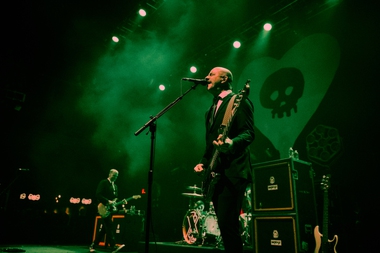Hey Eugene, how’s it going? Good man, just chillin’ in Rio.
You’ve lived there for a few years now. Does it feel like home? Yeah, I’ve pretty much become a part of the local landscape. It’s like, my 36th home (laughs). Maybe my 32nd home.
Which is your favorite? Brazil is right up there with New York City and, of course, my hometown Kiev—that’s a pretty rocking triangle for me. They are all beautiful in completely different ways. I wish they were a little bit closer. It’s like, 12-to-15 hour flights from one to the other, but you know a 15-hour flight ain’t sh*t to me no more. (laughs) [When] the flight is over they can’t even get me out of the plane. I still got my drinks coming, I got my writing going on, I’m completely in the swing there. Everybody hates it, and I love it (laughs).
Was Vegoose 2007 the last time you were in Vegas? Yeah.
And then you did a Las Vegas Weekly party DJ set after the fest. Exactly! That’s always an important part, because you can form a bond with the audience, and get some fresh tracks, too. Usually a lot of the people who come for a party are kids who are also mixing up some tracks, and they’re excited to solicit their stuff. I actually discover a lot of things that way. I’ve made some great creative friends that way.
Such as? My major co-producer here in Brazil: Pedro Meirelles. I met him exactly that way, checking out his demo he gave me while DJing. Then I tracked him down, and we basically set up a creative laboratory here in Rio, making tracks with bands that come through. I discovered a very cool band from Uruguay called Cuatro Pesos de Propina, really creative, pumping stuff. And in Buenos Aires, I discovered a great punk-tango band called Orquesta Tipica Fernandez Fierro. It’s not going to be served to you on a platter anywhere—you have to dig for it.
I hear some flamenco and salsa influence on Gogol Bordello’s July album Pura Vida Conspiracy Is that a product of those influences? Your location? I don’t know where it came from. I like my whole creative life to be quite messy, and I don’t know where things come from at all. Its unnecessary to know. I’m only just waiting for things to come together and [see] how they fit each other, not really forcing them to be in any way.
Actually, I tried so many different styles of writing but the way Pura Vida Conspiracy was written, there was nothing forceful about it. I wasn’t even trying to complete lyrics or dwelling on anything, I was literally just enjoying my life and walking around with songs in my head until they came together. The first time I wrote down lyrics was when it was time to print the lyrics for [the] album cover.
It’s drastically different [from] the way I was writing before, when I was writing quite laboriously, writing and rewriting. Maybe it had something to do with that English was still [my] second language, but now I’ve come to a point where I let the joy in my life pave the way. I just completely surrendered to the flow of joyous energy, and I let that really write itself. And, the significant discovery I made [was], the prolific level only increased. All the laborious things like writing on a table, I threw it out a window, and not only did it become more joyous, it became more prolific. But that’s just what works for me and only now. Who knows what’s ahead.
Did the recent recording hiatus help things happen naturally? I don’t know if it’s really that, because the intensity stays the same. I guess for a while there was a struggle in me between the fire and the frame, how to frame my own fire. But then I just said f*ck frame, and I became completely disinterested in that. I went back to where Russian literature came from, like Dostoevsky. [He] has very little form in his writing; it’s almost like little bursts of energy. So for a while, I was trying to find my approach to form. And then I just said, F*ck the form. I don’t need it. It will emerge.
That sounds like a real transformation in your writing style. Perhaps living different places and especially going to a tropic lifestyle, on one level it gives you a completely new perspective on life, but on another level your foundation re-emerges in a more obvious way. Because no matter what I do and no matter how much time I spend in Latin America, I will never become Brazilian, and I will never become Argentinian or Colombian, no matter how much I soak in local juice. I’m not trying to. I was never trying to reinvent myself or anything like that; it’s just the way I am. And here it becomes more obvious that I am from a very distinctly different tradition of energy, which is quite naturally chaotic.
Ukraine especially, but the whole region of Eastern Europe is located exactly between Asia and Europe, and consequently it doesn’t really have the benefit of either one. It doesn’t have the pragmatic structure of West Europe and it doesn’t have the whale of Eastern wisdom. But what it does have is a natural relationship with chaos. Slavic people are in a natural dance with chaos. If people in America don’t have their day planned out in front of them they get jittery, they get frustrated, they kind of think something’s wrong. But I assure you, nobody is bothered by that where I came from. It’s just the way it is. But our way is to turn chaos into beauty. It’s more artistic, yes, maybe more melancholy, but it seems like a more open way of life. So my writing has become more like that. There’s no real organization in it, no form. It’s just like, This is it.
What is the Pura Vida Conspiracy? What does that mean? Pura vida is “pure life,” but Pura Vida Conspiracy is a title that signifies that the life itself, the pure energy of life, appears to be some kind of thing that people can’t put a finger on, because they’re too busy living in the future, worrying about the future maniacally or they’re too busy living in the past, obsessed with their history or their f*cking problems. That’s basically the way most people spend all their life, and they’re just kind of walking around with this idea that maybe one day they will get to some place, or buy some house or get some job that will take all that paranoia away. But the truth is that all of that is very easy to let go of at any given moment.
One of the lines I really like from the new album is, “Borders are the scars on the face of the planet.” Is that the mind-set that inspires you to cross genres? Aha! Yeah, you can call it mind-set, more precisely you can call it feeling. I used to always have my guitars covered with all my stickers from all over the world: Spain, Australia, Siberia, Brazil. It’s like, the more you travel, the more you see that things are just bubbles and confetti, all these flags, all these political identities, they’re quite an artificial thing. And what emerges is more a vision of humankind truly as one family. Some people see it just like that.
Gogol Bordello With Crystal Antlers. October 12, 8 p.m., $25. Boulevard Pool, 698-7000.






